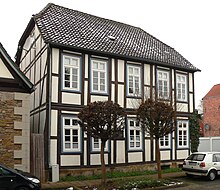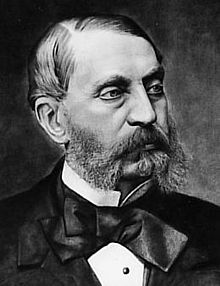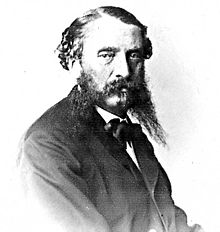Franz von Dingelstedt
Franz Freiherr von Dingelstedt (born June 30, 1814 in Halsdorf , † May 15, 1881 in Vienna ) was a German poet , journalist and theater director . He is considered an important theater director of the late 19th century; most recently he was director of the Vienna Burgtheater . He became famous for the Weser song he wrote , which was set to music by Gustav Pressel . His best-known literary work are the songs of a cosmopolitan night watchman .
Life
Franz Dingelstedt was born in Halsdorf near Marburg in 1814 as the son of an Kurhessian civil servant and grew up in the Kurhessian town of Rinteln on the Weser . There he attended the Ernestinum from 1821 and, at the age of 17, graduated from high school in 1831 as “primus omnium”. He then studied theology in Marburg from 1831 to 1834 at the request of his father . There he became a member of the Corps Schaumburgia and the Corps Guestphalia . However, he did not go into church service because, as he wrote in a letter to his friend Julius Hartmann, he “made profane songs and played comedy” during his studies ( Deetjen 1922, p. 64 ). Instead, he took a job as a teacher and initially taught in an "educational institution for young Englishmen, which flourished in Ricklingen near Hanover, and where I supposedly taught German, but in truth learned English" ( Dingelstedt 1878, p. 167 ). Overall, his descriptions of the time in Ricklingen sound more like a sociable than pedagogically strict everyday life.
In 1836, as he wrote self-ironically in a letter to his sister, he came to the Lyceum Fridericianum, today's Friedrichsgymnasium , in Kassel as an “interim assistant teacher-assistant” ( quoted from Heidelbach 1936, p. 188 ) ; here he published the first poetic works. He belonged to the Kassel literary circle Stiftshütte around Friedrich Wilhelm Müller and Friedrich Oetker . His satirical pictures from Hessen-Kassel , which mock the royal seat in a similar way to Heinrich Heine's Harzreise in 1826 the city of Göttingen , appeared in the magazine Europa in 1836 . The walks of a poet from Kassel, named after the example of Anastasius Grün, were printed in 1837 in the Wage , a supplement to the Kurhessische Allgemeine Landeszeitung , as a separate publication under the title Voices of the Desert in the volume of poems [1838]. These publications led to a transfer to the grammar school in Fulda in 1838. The novel Die neue Argonauten [1839], for which Dingelstedt had to pay a fine of 20 thalers because it contained a blasphemous passage, was written in the Kurhessian province, which was perceived as exile . Here he wrote what is perhaps his best-known work, the songs of a cosmopolitan night watchman [1841/42]. During this time he wrote: “Fulda is a fun place with many dignitaries. 93 business cards were on my mirror - you even buy my poems and read them in front of me. ”(Glossy p. 16). That should also have been the case when he was invited "as a welcome guest" to the ladies of the Freiadeligen Stift Wallenstein . Through the mediation of canon Auguste von Seckendorff, he was later given the position of councilor in Stuttgart (Lemberg p. 275). In 1838 he submitted his dissertation with the title “Prolegomena ad artem poeticam” to the University of Marburg , but it was rejected. With the subsequent application to the University of Jena , he was more successful, with the same job in absentia on May 18, 1838, he was awarded a Dr. phil. doctorate, but was not allowed to use the title in Hesse.
In 1840 Dingelstedt stood up for the liberal constitutional lawyer Sylvester Jordan , who had made massive efforts to get the Hessian constitution of 1831. Jordan was a symbolic figure in the fight against the reaction and was sentenced to several years in prison for alleged contacts with Republican forces. In his Easter word, Dingelstedt explicitly demanded: “Neig 'your Scepter, Friedrich Wilhelm, to redeeming notification!” ( Dingelstedt / Jordan 1848, p. 9 ) This text, which originally appeared as a leaflet, received great attention; Jordan, who also wrote a lyrical reply to Dingelstedt's poem, was not released until 1845.
In 1841 Dingelstedt finally quit school and left Fulda; the songs of a cosmopolitan night watchman appeared anonymously and with a cleverly surreptitious imprimatur in the same year by the Julius Campe publishing house (cf. for example Brinitzer 1962, p. 196ff). When the Prussian government issued a total ban on all works by this publisher in December 1841, Franz Dingelstedt was also among the opposition authors of Junge Deutschland such as Heinrich Heine, Heinrich Laube , Karl Gutzkow and August Heinrich Hoffmann von Fallersleben .
Franz Dingelstedt had been a journalist since the 1830s, built up an extensive network of contacts and published in at least 74 literary journals between 1835 and 1850. In Kassel in 1841 he was the first editor of the magazine Der Salon . Behind this strong media presence was the recognizable will for a career change. He wanted to emancipate himself from his bourgeois teaching profession and at an early age sought an editor's post at the Augsburger Allgemeine Zeitung published by Cotta ; this wish finally came true in 1841. However, for fear of the reaction to his Night Watchman songs, Dingelstedt was sent to Paris as a correspondent , then to London and Vienna. In London he met the singer Jenny Lutzer , whom he married in 1844. In Paris, despite anti-Semitic passages in his poem Das Frankfurter Ghetto ), he was warmly received by Heinrich Heine, who wrote in the poem At the Night Watcher's Arrival in Paris [1841]:
“Night watchman with long legs,
you come running around so disturbed!
How are my dear ones at home,
Has the fatherland already been liberated? "
In addition to Heine, he met Wolfgang Müller von Königswinter and Georg Herwegh in Paris in 1842 . The year 1843 is often seen as the turning point in Dingelstedt's life; up to this point in time he had turned against the politics of the Restoration and the feudal rule of the Duodec princes as an opponent. At the end of 1841, together with Georg Herwegh, he wrote the double poem Well-Born and High- Well Born . By two German poets in Paris . In the part he wrote, Hochwohlgeboren , Dingelstedt wrote:
“Many a man has already achieved it,
Who even higher than I thought,
Who crooked his verse perhaps
And crooked his back.
What one can do, I can too! - -
And despite the dangers and complaints,
I swear - St. Huber, hear me! -
I have to become a Privy Councilor! "
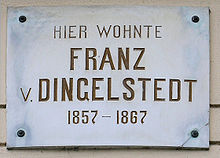
This last line is repeated at the end of every other stanza and is clearly meant ironically in the context of the poem; the courtly world and the spirit of the subjects are laughed at. It is all the more astonishing that, barely two years later, in 1843 in Stuttgart, Dingelstedt accepted a job with the King of Württemberg as a reader and librarian and was actually appointed councilor. This change of attitude made him enemies among the Young German authors, Heine also complained about Dingelstedt's “betrayal”, but remained connected to him by writing in the poem To the Night Watchman in 1844 (on a later occasion) :
"If your heart and style do not deteriorate,
you may play any game;
My friend, I will never fail to recognize you,
and should I also call you Mr. Hofrat. "
Other fellow poets felt betrayed by Dingelstedt; the former friend Georg Herwegh, for example, was based in a review of the volume of poems Nacht und Morgen in 1851 that he would like to "keep the theater manager Dingelstedt a few steps away". He resolutely opposed his “courtly wickedness” and judged: “But when absolute impotence appears with the pretension of being right, when a miserable renegade is enjoying himself, his feeble courtier's gall on the best cause and theirs from a royal love boudoir loyal supporters when a heartless esthete dares to flirt with black, red and gold ice cream gloves in front of the eyes of the German people who have been betrayed a thousand times over by the people of his glories, this presumption, this exhilaration, this flirtatiousness of deserved chastisement can and should don't miss it. ”( Herwegh 1851 ) The former friend Ferdinand Freiligrath summed up his disappointment:“ You are court councilor, u. I never want to be anything other than Freiligrath. "( quoted from Schoof 1940a, p. 213 )
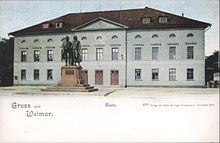
With the appointment to the court counselor and the position at the Württemberg court, Dingelstedt's life changed completely from 1843 onwards. After being employed in Stuttgart, where he also worked as the dramaturge of the court theater from 1846, he went to the court theater in Munich as director in 1851 , where the conservative Bavarian audience initially met the formerly oppositional Hessian lyric poet in a hostile and negative manner.In 1857, Dingelstedt came through Franz Liszt who worked there as opera director, as general manager at the court theater in Weimar . As early as 1850, Dingelstedt had written a prologue for the premiere of Wagner's Lohengrin there in order to make himself and his name known in this theater city. In a review of the premiere, Dingelstedt himself wrote that his prologue had been "received extremely kindly by the public" ( Dingelstedt 1850b ), while he showed little understanding for Richard Wagner's music and aesthetics . The later Weimar collaboration between Liszt and Dingelstedt failed despite their friendship because Dingelstedt clearly gave the drama priority and neglected the opera. A rift eventually broke out over various intrigues, and Liszt submitted his resignation.
In 1867 Dingelstedt became director of the Vienna Court Opera , which moved to the new house on Ringstrasse under his artistic direction. Also in 1867 he was ennobled by King Ludwig II. From 1870 he headed the Vienna Hofburgtheater, which is still reminiscent of Dingelstedt's work with a statue, and was elevated to the baron status by Emperor Franz Joseph in 1876.
Franz Dingelstedt died in Vienna in 1881 and was buried in the central cemetery (5A-4-80) next to his wife Jenny Lutzer, who died in 1877, in an honorary grave . In 1894, Dingelstedtgasse in Vienna's Rudolfsheim-Fünfhaus (15th district) was named after him. Streets in Hanover, Rinteln, Kassel and in the Fulda district of Ziehers-Süd are also named after him.
Act
The poet Dingelstedt essentially works in the field of poetry ( poems [1838], songs of a cosmopolitan night watchman [1841/42], poems [1845], night and morning [1851]). He also wrote novels and short stories ( Die neue Argonauten [1839], Unter der Erde [1840], Heptameron [1841], The Amazone [1868]). His drama Das Haus der Barneveldt, premiered in Munich in 1850, deserves mention as a stage work. In addition, he wrote dramaturgical and literary history works ( studies and copies after Shakspeare [sic! 1858], a Faust trilogy [1876], literary picture book [1878]) as well as translations of dramas by Shakespeare, Molières and Beaumarchais'.
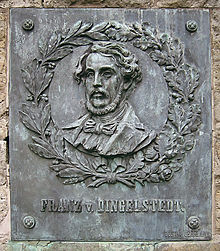
Franz Dingelstedt achieved popular fame for his Weser song, composed in Rinteln in 1835 (“Here I have so many lovely times / sat with my lute”), which was set to music by Gustav Pressel; the Weserliedanlage in Hann. Münden , which honors both the composer and the poet with bronze plaques.
In his History of German Literature , Eduard Engel summed up at the beginning of the 20th century: “And yet Dingelstedt was a poet; not a big one, but not a very small one. ”( Engel 1918, p. 188 ) This assessment can be maintained to this day. In his political poetry, Dingelstedt polemicized - similar to Hoffmann von Fallersleben in the songs of an unpolitical man [1840/41] or Georg Herwegh in his poems of a living person [1841, 2nd vol. 1843] against the political and social conditions in pre-revolutionary Germany. He castigated the reprisals by the Restoration, turned against the arbitrariness of the princes, clericalism , corruption , philistinism , the suppression of opinion by the censorship and the small states ; The motto of the second part of his songs by a cosmopolitan night watchman is : “Welt im Duodez; / The German understands it! ”( Dingelstedt 1978, p. 116 ) In these Nachtwächter songs he focused - partly in real places such as Frankfurt am Main , Munich, Kassel, Berlin, Vienna - on concrete examples in order to criticize them to compromise or ironize. In one of the songs he turned to the madness and practice in psychiatric hospitals and his assessment seems quite modern:
"What does not think the way we do, and not
feel the way we do, we count as sick,
And whether it is not health that speaks
from her tumbling thoughts?"
Unusual and consciously effective rhymes and enjambements as well as the creation of comedy are typical of Dingelstedt's style. In addition, he sometimes managed to find extremely apt images and formulations; he outlined the essence of a typical courtier in four lines:
"Starving, thirsting, yawning, freezing, being
echoing and being a machine , on top of that
losing in the whist
and in the dance decaying yourself -"
In particular, the metaphor “echo and machine” accentuates the image of man in Metternich's system, and the contrast between the first and last two lines expresses the turmoil between real life and courtly expectation, an image of man like Georg Büchner's drama conveyed. Joke, irony and satirical skepticism are those elements of political poetry that stylistically set Dingelstedt apart from many of his contemporaries and bring him close to Heinrich Heine, whose quality he certainly did not achieve. Hans-Peter Bayerdörfer nevertheless attested the songs of a cosmopolitan night watchman as having “stylistic brilliance” and “substantive explosiveness” (Bayerdörfer 1976, p. 79). The more than 80 poems not only show great diversity in terms of form (folk song verse, sonnet , ghazel , stanze, trochaic tetrameter, etc.), their content is also full of literary allusions and identify the author as an attentive observer of his time. Bayerdörfer also proved that Dingelstedt's night watchman cycle influenced Heine's style and as a direct inspiration for his verse epic Germany. A winter fairy tale [1844] had acted. (See Bayerdörfer 1976 pp. 75–95)
Furthermore, Dingelstedt is considered an important theater director of the late 19th century; his idea of decorative stage design met the taste of the public to a large extent. While Heinrich Laube, as the predecessor in the office of Burgtheater director , focused on the text and worked on the language of its actors , while defaming any excess on the stage as "wallpapering dramaturgy ", the stage design had absolute priority for Dingelstedt. Opulent equipment and stage technology were extremely important to him, especially in the genre of historical drama. During his time in Munich he had already worked as a set designer with the painter Wilhelm Kaulbach . When Hermann Broch spoke of an “eclectic style conglomerate […]”, “that made up the nineteenth-century non-style”, then he didn't just mean the historicist architecture of Vienna's Ringstrasse , but also referred to the theater. There one found “all the decorative beauty” and here the “desire for assured, partly pompous, partly carefree enjoyment of art and life” ( Broch 1955, p. 49 ) was satisfied. In this sense, Dingelstedt's theater was both a skilful approach to the audience and an economically effective way of keeping pace with the ever-growing entertainment and operetta theaters. In his study of Goethe's Faust , Dingelstedt drafted a dramaturgical concept that brings both parts of the drama onto the stage over three evenings. This Faust trilogy [1876] showed, on the one hand, that as a director, Dingelstedt dealt with the text in a usurpatory manner in order to achieve his goal of a stage-appropriate representation, on the other hand, had very concrete and pictorial ideas of this implementation. In addition, it becomes clear that Dingelstedt's will to reproduce realistically was not free from exaggerations; the poodle, when Mephisto appears, has to go on stage as a real trained dog, he postulated. One critic later called Dingelstedt's concept of Faust, not entirely wrongly, “a strange conglomerate of tastelessness and ideas.” ( Pfeiffer-Belli 1931 pp. 46–48 )
As a program designer, Franz Dingelstedt turned away from the general preference for French plays, which he described as "fairground goods", as "mockery of dirt and fire" (Dingelstedt 1876, p. 110), and set three main priorities: He promoted the dramas Friedrich Hebbels , who, he said, had “always had a special attraction” for him. The “sometimes quite difficult work” of the production seemed to him “as if he was busy with his own work.” ( Dingelstedt 1878, p. 221 ) Dingelstedt was also personally friends with Hebbel, staged his Judith in Munich and mediated in 1852 the world premiere of Agnes Bernauer . He finally premiered Hebbel's Nibelungen in Weimar in 1861 , whereupon the poet expressed his gratitude in a letter dated May 20, 1861: “Whatever one may say about my share in the Nibelungen in the future, you will become yours in theater history as a glorious one. "( quoted from Wellhausen 1988, p. 145 )
Dingelstedt also made an outstanding contribution to the performance of the dramas of the classics, between 1851 and 1855, under Dingelstedt's artistic directorship, an average of 40 classics were staged a year in Munich. In 1854 he organized a so-called complete guest performance, in which plays by Goethe, Schiller, Lessing and Kleist were also performed with the participation of foreign actors. He was also President of the Schiller Foundation from 1859 to 1865. In a Weimar theater prologue for the Shakespeare jubilee, Dingelstedt wrote with a parodistic view of Schiller's guarantee : "See, today, the third in the holy federation, / The British join Germany's Dioscuri ." ( Dingelstedt 1877, vol. 9 , P. 43 ) In addition to Goethe and Schiller, the works of William Shakespeare represented another milestone in Dingelstedt's program design. In 1864, on the occasion of his 300th birthday, he staged Shakespeare's royal dramas as a cycle for the first time on the German stage in Weimar and founded them together that same year with Wilhelm Oechelhäuser the German Shakespeare Society , for whose second Vice President he was elected.
The Shakespeare Week at the Vienna Burgtheater should also be mentioned in this context ; From April 17 to April 23, 1875 King Richard II , King Henry IV , King Henry V , King Henry VI. and King Richard III. played. Dingelstedt's Shakespeare productions are based on his own transmissions, whereby he dealt very freely with the original, broke away from Schlegel's aesthetic ideals and tried to highlight a popular and theatrical Shakespeare. The Shakespeare transmissions made up a large part of Dingelstedt's work, but were already assessed as arbitrary and unauthorized by his contemporaries.
Dingelstedt's biography as well as his oeuvre seem to fall into two parts, an early opposition work that was punished with appropriate reprisals by the censors, and an adapted existence as a councilor and director of various court theaters. The myth of the turning point of 1843 is still omnipresent in Dingelstedt research, but an objective consideration is difficult, since many of his texts have appeared in newspapers and magazines and are therefore difficult to access or no longer exist. The edition of the complete works in twelve volumes, published in 1877, was compiled by Dingelstedt himself and the texts were partly heavily edited and defused. In his dissertation (Gebhardt 2004, pp. 117ff), Andreas Gebhardt rightly pointed out that 1843 was not a sudden change of mind. He also characterizes the young teacher and journalist in Ricklingen, Kassel and Hersfeld as extremely careeristic and shows that the revolutionary is just one facet next to the established and traditional Dingelstedt, which one could in a certain way accuse of opportunism . Paul Heidelbach asserted as early as 1936 that Dingelstedt did not become a political poet out of conviction, but through a coincidental contemporaneity. "He has nowhere committed to a political conviction, his liberalism [...] had its roots only in aesthetic feelings." ( Heidelbach 1936, p. 91 ) Thus, the employment at the court in Stuttgart is not unexpected, but rather a different path to celebrity and professional success. More apt than the picture of the U-turn is probably that of lifelong inner turmoil, which is also expressed in the following quatrain that Dingelstedt addressed to "Paul Lindau, the author of my future necrologist":
"If you bury me (as late as possible), you
can read this on my stone:
He was lucky all his life, but
he was never happy."
Works (selection)
- [anonymous] Pictures from Hessen-Kassel . In: Europe. Chronicle of the educated world. 4 (1836). Pp. 69-80.
- Poems. Kassel / Leipzig 1838.
- The new Argonauts. A strange novel. Fulda 1839.
- The Weserthal from Münden to Minden. Kassel 1839.
- Six centuries of Gutenberg's life. Small gift for a big celebration. Kassel 1840.
- [anonymous] Songs by a cosmopolitan night watchman. Hamburg 1841. Digitized version of the 1842 edition: Pedagogical Digital Library
- [with Sylvester Jordan] Zeitstimmen from Hessen. 1840-1848. Kassel 1848.
- The Barneveldt House. Dresden 1850a.
- The Goethe day. In: Augsburger Allgemeine Zeitung of September 4, 1850. pp. 3947-3949. (1850b)
- Night and morning. Stuttgart 1851.
- Studies and Copies after Shakspeare. Pest / Vienna / Leipzig 1858.
- The Amazon. Stuttgart 1868.
- A Faust trilogy. Dramaturgical study. Berlin 1876.
- All works. 12 vol. Berlin 1877.
- Literary picture book. Berlin 1878.
- Munich picture sheet. Berlin 1879.
- Songs of a cosmopolitan night watchman. Study edition with commentary and Einl. Ed. v. Hans-Peter Bayerdörfer. Tuebingen 1978.
literature
- Hans-Peter Bayerdörfer: eulogy for a night watchman. Marginalia on the relationship between Heine and Dingelstedt. In: Heine Jahrbuch 1976. pp. 75-95.
- Hans-Peter Bayerdörfer: Michel and the Patriots [interpretation of Dingelstedts Three New Pieces with Old Wise Men]. In: Poems and Interpretations. Vol. 4. From Biedermeier to Bourgeois Realism. Ed. V. Günter Häntzschel. Stuttgart 1983. pp. 253-262.
- Christiane Chalaupka: Franz Dingelstedt as a director. From the scenic mood painting to the total work of art. Vienna 1958.
- Wilhelm Dewald: Dingelstedt's house of Barneveldt, examined for its origin and appreciated. Marburg 1920.
- Werner Deetjen (eds.): Franz Dingelstedt and Julius Hartmann. A childhood friendship in letters. Leipzig 1922.
- Franz Frhr. from Dingelstedt. The poet of the Weser song. Compiled and edited by Edmund Sindermann. Rinteln 1981.
- Andreas Gebhardt: The salon. An Kurhessisches literaturblatt in the press conditions of the Vormärz. Frankfurt / Main 2004.
- Ludwig Geiger: Dingelstedt, Franz . In: Allgemeine Deutsche Biographie (ADB). Volume 47, Duncker & Humblot, Leipzig 1903, pp. 707-725.
- Karl Glossy : From the letter folder of a Burgtheater director. With a biographical sketch and notes. Vienna 1925.
- Paul Heidelbach: From Franz Dingelstedts Sturm und Drangzeit. In: Hessenland 1936 . Pp. 185-192.
- Paul Heidelbach: Franz Dingelstedt's fine. In Hessenland 1914 . Pp. 215-216.
- Paul Heidelbach: Afterword. In: Franz Dingelstedt: The new Argonauts. Kassel 1931. pp. 209-221.
- Andrea Hofmann-Wellenhof: The manuscript journal of the Burgtheater management Franz von Dingelstedt. Authors and their plays December 19, 1870 to May 15, 1881. Vienna 2003.
- Alfred Joeckel: From Dingelstedt's time in Kassel. Some of the poet's letters that have been unknown since then. In: Hessenland 1914 . Pp. 242-247, 264-266 and 282-283.
- Hans John: Unpublished letters from Fran Liszt to Franz Dingelstedt. In: Contributions to musicology 16 (1974). Pp. 137-153.
- Julius Campes letters to Franz Dingelstedt. In: magazine for book lovers. New episode, VI. Vol. (1914/15) 2nd part. Pp. 315-324.
- Herbert Kater: The Corps Schaumburgia in Marburg 1831-1834. In memory of Franz von Dingelstedt Schaumburgiae, the poet of the Weser song . Einst und Jetzt , Vol. 8 (1963), pp. 5-35.
- Maria Kaune: Franz Dingelstedt's years in Munich. In: Franz Frhr. from Dingelstedt. The poet of the Weser song. Compiled and edited by Edmund Sindermann. Rinteln 1981. pp. 66-73.
- Bernhard Klostermann: Franz Dingelstedt. His youth and the development of his political poetry. Munster 1912.
- Hans Knudsen : From Dingelstedt's Hessian youth. Bad Nauheim 1964.
- Hans Knudsen: From Franz Dingelstedt's time in Fulda. In: Hessenland 1914 . Pp. 181-185.
- Joachim Kühn: Kassel in Dingelstedtscher lighting. In: Hessenland 1914 . Pp. 177-181 and 196-199.
- Otto Liebscher: Franz Dingelstedt. His dramaturgical development and activity until 1857 and his stage management in Munich. Hall 1909.
- Rudolph Lothar: Franz Dingelstedt in Vienna. Reprinted in: Franz Frhr. from Dingelstedt. The poet of the Weser song. Compiled and edited by Edmund Sindermann. Rinteln 1981. pp. 81-89.
- Otto Mayr: Franz Dingelstedts prose poem . Augsburg 1926.
- Carl Niessen: Dingelstedt, Franz Ferdinand von, Freiherr von. In: New German Biography (NDB). Volume 3, Duncker & Humblot, Berlin 1957, ISBN 3-428-00184-2 , p. 727 f. ( Digitized version ).
- Wilhelm Pfeiffer-Belli: Goethe's Faust I in Dingelstedt's arrangement. In: The new way 60 (1931). Pp. 46-48.
- Eva Rademacher: Franz Frhr. von Dingelstedt - a biographical sketch. In: Franz Frhr. from Dingelstedt. The poet of the Weser song. Compiled and edited by Edmund Sindermann. Rinteln 1981. pp. 9-32.
- Jürgen Rinne: Dingelstedt as a high school student in Rinteln. In: Franz Frhr. from Dingelstedt. The poet of the Weser song. Compiled and edited by Edmund Sindermann. Rinteln 1981. pp. 34-42.
- Julius Rodenberg : Home memories of Franz Dingelstedt and Friedrich Oetker. Berlin 1882.
- Julius Rodenberg: Franz Dingelstedt. Sheets from his estate. Berlin 1891.
- Rudolf Roenneke: Franz Dingelstedts effectiveness at the Weimar court theater. A contribution to the history of theater in the 19th century. , Verlag H. Adler, Greifswald, 1912, at Open Library and Internet Archive .
- Wilhelm Schoof (Ed.): Correspondence between Dingelstedt and Freiligrath. In: Westfälische Zeitschrift 96 (1940a) . Pp. 187-226.
- Wilhelm Schoof (ed.): Dingelstedt and Freiligrath. Based on unpublished letters from the Goethe-Schiller archive in Weimar. In: Westfalen 29 (1951) 1. pp. 77-86.
- Wilhelm Schoof (Ed.): Dingelstedts plan of a new Shakespeare translation. In: Shakespeare-Jahrbuch 76 (1940b). Pp. 137-160.
- Wilhelm Schoof (Ed.): Franz Dingelstedt as a high school teacher in Fulda. Reprinted in: Franz Frhr. from Dingelstedt. The poet of the Weser song. Compiled and edited by Edmund Sindermann. Rinteln 1981. pp. 51-56.
- Wilhelm Schoof (Ed.): Franz Dingelstedt in Weimar. Reprinted in: Franz Frhr. from Dingelstedt. The poet of the Weser song. Compiled and edited by Edmund Sindermann. Rinteln 1981. pp. 74-80.
- Wilhelm Schoof (Ed.): Franz Dingelstedt and the Brothers Grimm. In: Hessenland 1931. pp. 134-136.
- Hans Sperling: Franz Dingelstedt's poetry examined for its sources and models. Munster 1927.
- A. Stiepka: Franz Dingelstedt as director of the Hofburgtheater. Vienna 1949.
- Karl von Stockmayer: Franz von Dingelstedt's Stuttgart years 1843–1850. Abridged reproduction in: Franz Frhr. from Dingelstedt. The poet of the Weser song. Compiled and edited. by Edmund Sindermann. Rinteln 1981. pp. 57-64.
- Hermann Uhtenwoldt: Franz Dingelstedt as a Marburg student. Reprinted in: Franz Frhr. from Dingelstedt. The poet of the Weser song. Compiled and edited by Edmund Sindermann. Rinteln 1981. pp. 43-48.
- Andreas Wicke: "Sleep well, you cold, beautiful city". Franz Dingelstedt in Kassel Vormärz. In: Hessen slowly. Places of extended time. Ed. V. Martin Maria Schwarz / Ulrich Sonnenschein. Marburg 2006. pp. 126-130.
- Margret Lemberg: Marianne vom Stein and the Wallenstein Abbey in Homberg / Efze and Fulda . Marburg 2007, ISBN 978-3-7708-1302-5
- Ulrich Schambony: A productive transfer of punishment Newspaper report on a lecture on Dingelstedt, Fuldaer Zeitung from September 15, 2010
- Richard Mellein: "Laudation to a night watchman. Marginalia on the relationship between Heine and D." In Heinrich Heine Institute (ed.): "Heine Yearbook 1976. 15th Volume" Hoffmann and Campe, Hamburg 1976, ISBN 9783455090123 , pp. 75-95.
- Constantin von Wurzbach : Dingelstedt, Franz von . In: Biographisches Lexikon des Kaiserthums Oesterreich . 24th part. Imperial-Royal Court and State Printing Office, Vienna 1872, p. 390 ( digital copy ).
Web links
- Literature by and about Franz von Dingelstedt in the catalog of the German National Library
- Works by and about Franz von Dingelstedt in the German Digital Library
- Works by Franz von Dingelstedt at Zeno.org .
- Works by Franz von Dingelstedt in the Gutenberg-DE project
- Franz Frhr. von Dingelstedt in the Lexicon of Westphalian Authors
- limited preview in Google Book search
- Entry on Franz von Dingelstedt in the Austria Forum (in the AEIOU Austria Lexicon )
- Franz von Dingelstedt: On the Weser. Text and illustrations
- Annotated link collection of the university library of the FU Berlin ( Memento from August 9, 2013 in the Internet Archive ) (Ulrich Goerdten)
- Franz von Dingelstedt in the Internet Archive
Individual evidence
- ^ Kösener corps lists 1910, 165 , 8
- ^ Werner Deetjen (eds.): Franz Dingelstedt and Julius Hartmann. A childhood friendship in letters. Leipzig 1922.
- ^ A b c Franz von Dingelstedt: Literary picture book. Berlin 1878.
- ^ A b Paul Heidelbach : From Franz Dingelstedts Sturm und Drangzeit. In: Hessenland 1936 .
- ↑ cf. Paul Heidelbach: Afterword. In: Franz Dingelstedt: The new Argonauts. Kassel 1931, pp. 209-211.
- ↑ Hans Knudsen : From Dingelstedt's Hessian youth. Bad Nauheim 1964, pp. 52-96.
- ^ Franz von Dingelstedt, Sylvester Jordan: Zeitstimmen aus Hessen. 1840-1848 . Kassel 1848.
- ^ Carl Brinitzer: The quarrelsome life of the publisher Julius Campe . Hamburg 1962.
- ^ A b Andreas Gebhardt: The salon. An Kurhessisches literaturblatt in the press conditions of the Vormärz. Frankfurt / Main 2004.
- ↑ Dingelstedt wrote: "Wherever you go, you will take Jews, / Everywhere the Lord's favorite people! / Go, lock them again in the old streets, / Before they lock you in the Christian quarter!" (Quoted from Götz Aly: Why the Germans? Why the Jews? Equality, envy and racial hatred 1800–1933. Fischer Taschenbuch Verlag, Frankfurt / M. 2012, p. 266
- ↑ a b Heinrich Heine: Complete poems in chronological order. Ed. V. Klaus Briegleb. 5th edition Frankfurt / Main 1997.
- ↑ a b c d Songs of a cosmopolitan night watchman. Study edition with commentary and Einl. Ed. v. Hans-Peter Bayerdörfer. Tuebingen 1978.
- ↑ Georg Herwegh: Night and Morning . [Review from 1851]. (June 18, 2006)
- ^ Wilhelm Schoof (Ed.): Correspondence between Dingelstedt and Freiligrath. In: Westfälische Zeitschrift 96 (1940a).
- ^ Franz von Dingelstedt: Münchener Bilderbogen. Berlin 1879.
- ^ Otto Liebscher: Franz Dingelstedt. His dramaturgical development and activity until 1857 and his stage management in Munich. Hall 1909.
- ^ Rudolf Roenneke: Franz Dingelstedts effectiveness at the Weimar court theater. A contribution to the history of theater in the 19th century. Greifswald 1912.
- ^ Franz von Dingelstedt: The Goethe Day. In: Augsburger Allgemeine Zeitung of September 4, 1850. P. 3948 (1850b)
- ^ Eduard Engel : History of German Literature from the Beginnings to the Present. 2nd vol. 28th edition Vienna / Leipzig 1918.
- ^ A b Hans-Peter Bayerdörfer: Laudation to a night watchman. Marginalia on the relationship between Heine and Dingelstedt. In: Heine yearbook 1976.
- ↑ Hermann Broch : Hofmannsthal and his time. In: ders .: Dense and recognize. Essays. Vol. 1st ed. And introduced by Hannah Arendt . Zurich 1955. pp. 43-181
- ^ Wilhelm Pfeiffer-Belli: Goethe's Faust I in Dingelstedt's adaptation. In: The new way 60 (1931).
- ^ Barbara Wellhausen: Friedrich Hebbel. His life in texts and pictures. Heath 1988.
| personal data | |
|---|---|
| SURNAME | Dingelstedt, Franz von |
| BRIEF DESCRIPTION | German poet and theater director |
| DATE OF BIRTH | June 30, 1814 |
| PLACE OF BIRTH | Halsdorf in Upper Hesse |
| DATE OF DEATH | May 15, 1881 |
| Place of death | Vienna |

